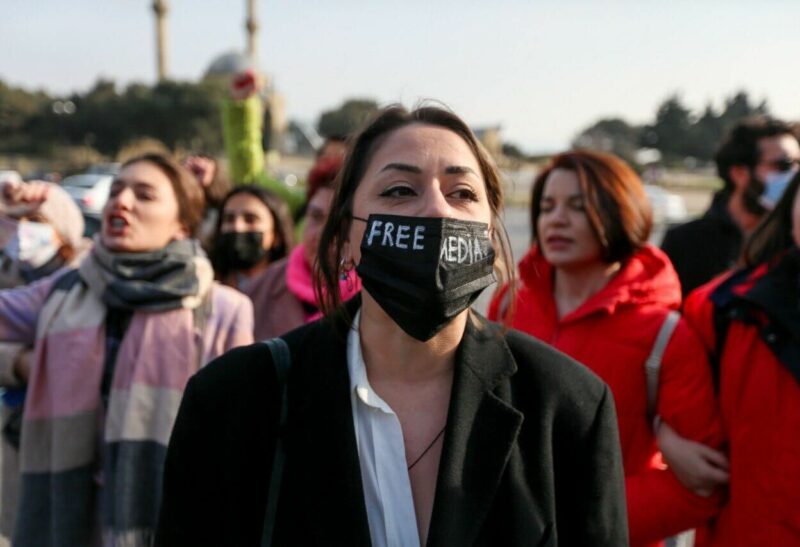
Ilham Aliyev has been the president of Azerbaijan since 2003. He is regularly criticized by civil society organizations, opposition parties and international organizations for building an authoritarian regime and consolidating power in the hands of his family.
Aliyev rules over all the executive, legislative and judicial institutions of the country.
Despite his absolute control, it is still his father, Heydar Aliyev – the former president of the country (1993 – 2003) – who remains portrayed both in official narratives and amongst the general public as the national savior; as the true leader of the nation, akin in symbolism to Turkey’s Ataturk.
Although Ilham Aliyev has had ample opportunity to overtake his father and replace his image with his own, he has never done so, choosing instead to preserve and reinforce the memory of his father upon the nation and quietly continue in his shadow.
This provokes two questions.
First, why has Aliyev Jr. decided to preserve his father’s personality cult, and what has prevented him from creating his own? Why does Heydar’s personality cult continue to be promoted in the official rhetoric of the Azerbaijani political elite? Taking into consideration the precarious and dangerous economic crisis in the country, usurping his father’s place may be a wise move to survive the current political climate in Azerbaijan.
Second, why has Heydar Aliyev been immortalized by the public at large? Accepting for a moment the ubiquitousness of Heydar’s image in public life, in the mind of the people of Azerbaijan there does seem to exist a certain something about Heydar’s legacy that inhibits both the government and the people from leaving him in the past.
A Good Man For Bad Times
Unlike his son, Heydar Aliyev had a large pool of political experience to draw from when he came to power in 1993.
Starting his career in the Azerbaijan SSR People’s Commissariat for State Security (NKGB) – precursor of KGB) – in 1944, he managed to ascend to the leadership of the highest political institutions of the Soviet Union. He led the Central Committee of the Azerbaijani Communist Party from 1969 to 1982, before being appointed by Yuri Andropov to the post of First Deputy Chairman of the Council of Ministers of the USSR.
During his tenure as the head of the Azerbaijan SSR, the republic made important achievements and achieved higher economic growth than in earlier years, however, this period was also marred by entrenched corruption at many levels of socio-political life.
Prior to the dissolution of the USSR, Aliyev resigned his membership in the Communist Party of the Soviet Union and returned to Azerbaijan. He was not immediately promoted to the leadership of the country and spent most of his time in his hometown Nakhichivan leading the Supreme Soviet of the Nakhchivan Autonomous Republic.
Between 1991 – 1993, Azerbaijan passed through troublesome times: the country was hit by economic crisis, political chaos, an intensely painful war with Armenia in which the country suffered consistent defeats in battle, the loss of territories and of thousands of lives. The political leaders of the country demonstrated serious incapability in successfully dealing with these challenges and finally ceded rule of the country to Heydar Aliyev.
The fundamental success of Heydar Aliyev was establishing stability
Upon his return to power, Heydar Aliyev rushed to stop the war with Armenia at any cost. In a short period of time, a ceasefire agreement was signed and territories occupied by Armenia remained under the control of Armenian troops.
Azerbaijani political expert Zardust Alizadae even
argues
that Aliyev Sr. was determined to end the war in order to generate favorable conditions to transform the country into his family business.
He was remarkably successful in establishing stability in the country. During his reign, the inflation rate
plummeted
from the four-digit levels of the early 1990s to one digit towards the end of the decade. Baku made a number of hydrocarbon extraction and transportation contracts with foreign countries and firms. Azerbaijan signed an oil contract with 8 countries and 13 oil companies for oil extraction from the Caspian Sea. This contract, which went down in Azerbaijani history as “The Contract of the Century”, brought massive profits to the country starting from 1999. In 2002, the revenues of the state coffers were
85 times
, the expenses were
72 times more
than they were in 1993.
The Azerbaijani people, having suffered from the troubles of early 1990s, embraced these achievements and the man behind them. The established stability ended the chaos and brought a ‘normal’ life back to the nation. Thanks to the influx of oil revenues, many found the means to make a living. These accomplishments allowed Heydar Aliyev to build a cult of personality around himself, and to engrain himself in the mind of many Azerbaijanis as the “national savior.”
During Aliyev Jr’s Reign, Stability Has Transformed Into Stagnation, Circumscription of Political Liberties and Kleptocracy
In 2003, Ilham Aliyev, a young and relatively inexperienced politician, rose to the leadership through nepotism rather than meritocracy, unlike his father.
He had started his political career in 1994, just 9 years before becoming president, by being appointed the vice-president of the State Oil Company of Azerbaijan (SOCAR), which was possible only thanks to the presidency of his father.
Against this political background, the son Aliyev couldn’t help but declare that he would follow the economic and political course of Heydar Aliyev. Having built his presidency on this foundation, Heydar Aliyev became a “political programme” and “political marketing brand” for Ilham. Prior to the presidential elections in 2003, he vowed to stick to the governing principles of his father.
He kept his promise, but only in one aspect: he spared no effort to preserve stability, which became the guarantee of his stay at the head of the republic. Experts
claim
that Heydar Aliyev had foreseen the necessity of stability for his son’s presidency and that this was one of the primary reasons why he tried to leave behind a country without a territorial conflict, at the expense of compromising Azerbaijani territories.
Although the early years of Ilham Aliyev’s reign marked the continuation of economic growth due to the fact that the country was receiving increasingly more oil revenue, the stability soon transformed into stagnation, the circumscription of political liberties and kleptocracy. Most of the political leaders of the country during Heydar Aliyev’s presidency maintained their positions and enriched themselves thanks to the younger Aliyev’s failure to deal properly with corruption amongst the political elite.
“Officials used to be afraid of Heydar Aliyev. They aren’t afraid of his son.”
This type of governance dramatically aggravated the lives of hundreds of thousands of Azerbaijani people all over the country. Corruption reached its peak; officials disregarded the needs of the people and leaders set about building up their wealth. Against this background, unemployment skyrocketed, poverty became rampant throughout the country, and this pushed the nation into the current situation which is, some might say, hardly better than that of the early 1990s. The decline of oil prices in recent years has further complicated the situation and shaken the columns of the government.
Under the existing circumstances, many Azerbaijanis who feel helpless against the strongly protected government cannot help but yearn for the better days of the father Aliyev’s times. Ordinary people complain that the officials do not take the reprimands of the President seriously. They lament that
“officials used to be afraid of Haydar Aliyev, but they are not afraid of his son.”
The nation’s longing for Heydar Aliyev gets stronger as the country’s leadership poorly handles the economic crisis that is destroying the lives of millions of people and forcing many to emigrate. Although Ilham Aliyev’s failure to successfully continue his father’s economic and political policies strictly weakens his rhetoric, the government still praises the achievements of Heydar Aliyev: if not only because, like stability, the Father is an inherently important foundation of the Son’s rule.



